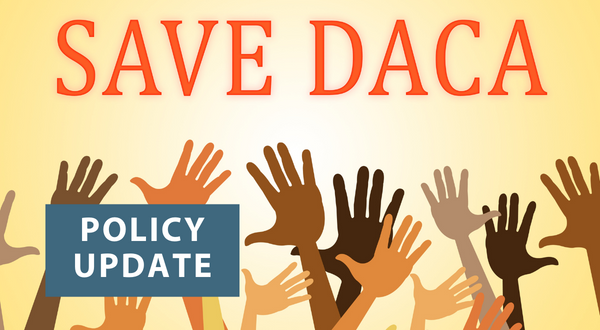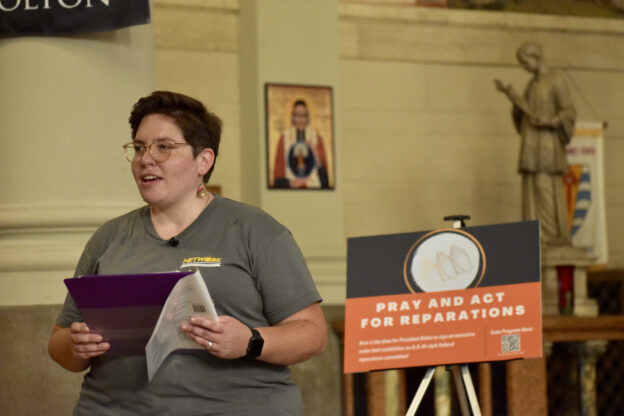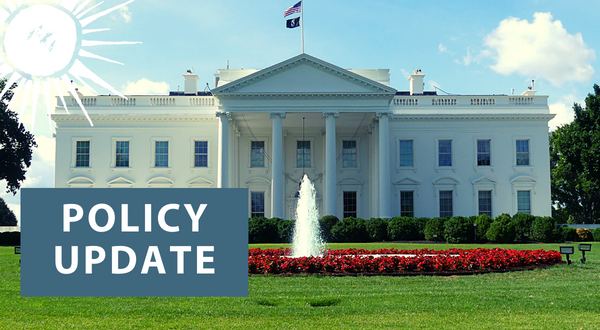
Dreams of Inclusion
Inaction by Congress Costs DACA Recipients the Ability to Participate Fully in a Democracy They Help Make Flourish
Sydney Clark
June 11, 2024

Ivonne Ramirez speaks about her experiences as a child immigrant and Deferred Action for Childhood Arrivals (DACA) program participant during Mass at Mary Mother of the Church Parish in St. Louis. Photo: Sid Hastings
Ivonne Ramirez was 8 when her family migrated to the U.S. from Mexico City. They arrived in St. Louis, Missouri, where her father and a sibling had been living for about a year.
“It took seven days to get to St. Louis,” Ramirez says. “I was mostly walking to cross the border. It took a lot out of me.” Her father, a police officer, left Mexico due to safety concerns after raiding a money-laundering operation inside a bar. He was only able to bring one of his children. Ramirez journeyed with her mother and three other siblings.
“I was sleep-deprived, and people kept telling me, ‘If you keep going, you’re gonna see your dad’,” she says. “Not seeing my father for a year felt like a lifetime.”
A few years after the family reunited, Ramirez became eligible for the DACA (Deferred Action for Childhood Arrivals) program, which began in 2012 as an executive action by President Barack Obama. This year marks a decade for Ramirez as a recipient.
She and her family still resides in St. Louis. She works full-time doing quality control for a medical equipment company. On weekends, she serves as a catechist at Our Lady of Guadalupe Parish in Ferguson, Missouri. “It feels like home. I’ve been here for most of my life,” Ramirez says.
Shut Out
While DACA has allowed Ramirez to attend school and get a driver’s license and a work permit, the realities of being a recipient remain at the forefront. She is one of roughly 580,000 active DACA recipients.
“Our permits and status allow us to be here for two years, and then we have to renew six months before,” she says. “This year, I’m OK, but next year, I have to start thinking about sending all the paperwork and the fee, which is $495. How will I get that extra income to pay for that?”
Recipients are ineligible to vote in federal elections, and Ramirez’s voting rights are nonexistent. Some states and municipalities allow noncitizens to vote in local elections like city councils, mayoral and school boards. Missouri is not one of them.
“If you pay your taxes, contribute to society, and show that you’re a model citizen, I don’t see why the efforts to put something permanent for [us] aren’t there,” Ramirez says.
In 2022, NETWORK honored Ramirez as one the organizations’ inaugural “Social Poets,” young justice-seekers whose lives and work define the challenges and possibilities of the coming decades. Unfortunately, permanent legal status for undocumented people in the U.S. remains an unaddressed challenge.

Juliana Macedo do Nascimento, deputy directory of federal advocacy at United We Dream and a DACA recipient. Photo: Diana Alvarez
At its height, DACA had around 840,000 recipients, says Juliana Macedo do Nascimento, deputy director of federal advocacy at United We Dream, the largest immigrant youth-led network in the country. A DACA recipient herself, she was 14 when her family migrated to the U.S. from Brazil. Macedo do Nascimento calls DACA the largest “victory of the immigration movement in decades.”
The program, however, has faced ongoing legal battles since its origin, leaving recipients in constant limbo.
“Many don’t know how much danger the policy is in,” Macedo do Nascimento says. The latest challenge happened on Sept. 13 of last year, when Texas federal judge Andrew Hanen ruled again that DACA is unlawful. Now, DACA will likely revisit the Supreme Court in 2025.
Although Hanen blocked new program applications, he left DACA unchanged for existing recipients during the anticipated appeals process. Recipients can continue to renew and apply for Advance Parole, which allows certain immigrants to leave the U.S. and return lawfully, said Macedo do Nascimento.

Bruna Bouhid, senior communications and political director at United We Dream, at a UWD Congress in Miami. Photo: United We Dream
“You feel like you’re on a roller coaster,” says Bruna Bouhid, senior communications and political director at United We Dream. “You never know if this will be your last chance to apply or if, in a year or six months, you will lose all those things you had planned for or worked hard to get.”
Bouhid, who became a recipient at 20, says the legal fights reveal that DACA will “not be our saving grace. We need something permanent. We need citizenship.”
Government Inaction
“It’s really up to Congress to find and support the solution,” says Christian Penichet-Paul, assistant vice president of policy and advocacy at the National Immigration Forum. “It’s the only branch of government that can ensure DACA recipients and other young DREAMers can stay in America long term and potentially become lawful permanent residents.”
Penichet-Paul says distrust among both parties and lack of courage helped derail legislative action and execution. He also predicts immigration reform talks in Congress will not advance during this election year.
“Democracy is such a precious thing, and it can take a long time to come up with a compromise,” Penichet-Paul says. “Sometimes, getting to the right place requires multiple little steps.”
As to when a policy window might open up, he notes, “It’s always said that Congress works best on a deadline. Unfortunately, that might be the next Supreme Court decision.”
Penichet-Paul stresses that there is bipartisan agreement and existing text that can serve as the bill that “finally provides permanence for young DREAMers who’ve been in America since they were little kids.”
One option could be a new version of the DREAM (Development, Relief and Education for Alien Minors) Act, first introduced in 2001. A version introduced last year by Senators Dick Durbin (D-Ill.) and Sen. Lindsey Graham (R-SC) would permit noncitizens brought to the U.S. as children to earn permanent residence aft¬er meeting specific education or work requirements. Durbin and Graham introduced similar legislation in the last three sessions of Congress.

Ivonne Ramirez speaks to parishioners at Mary Mother of the Church Parish in St. Louis. Ramirez, one of NETWORK’s “Social Poets,” has been a DACA recipient for the past decade. Photo: Sid Hastings
Additionally, Rep. Linda Sanchez (D-CA) introduced the U.S. Citizenship Act of 2023, which would tackle the sources of migration, reform the visa system, and “responsibly manage the southern border.”
“We can have a pragmatic system, looking at who needs and wants to migrate, but let’s create a system that is fair and humane for everyone,” Bouhid says.
Ramirez admits that she’s “a little scared” for the looming 2024 election but encourages those eligible in her community to vote.
“A lot of Americans know at least one, if not many, DACA recipients and immigrants,” she says. “If you get to know them and understand why they came to the U.S., you would happily vote in honor of them.”
Ramirez says her Catholic faith inspires her to be vocal about the challenges immigrants face.
“I never want to stop talking about us and why we need to become citizens,” she says.
Penichet-Paul says immigrants have grown up as “American as any U.S. citizen in many ways” and take civic participation and community service seriously.
“Immigrants are often some of our strongest allies in maintaining democracy and the institutions that allow our democracy to prosper,” Penichet-Paul adds. “Democracy can coexist with DACA and immigration. They’re about good governance and ensuring that people can reach their full potential, nothing more, nothing less.”
Sydney Clark is a New Orleans native and multimedia producer based in Washington, D.C.















